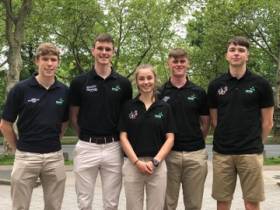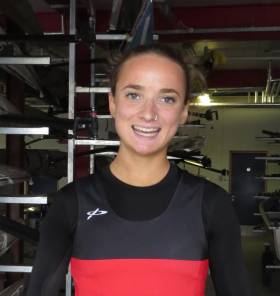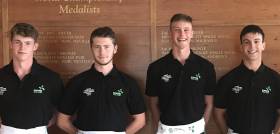Displaying items by tag: Jack Dorney
#Rowing: The Afloat Rowers of the Month for May are the Ireland men’s junior coxed four which took silver at the European Junior Regatta in Essen, Germany. The crew of Matthew Gallagher (St Joseph’s), James O’Donovan (Castleconnell), Jack Dorney (Shandon), John Kearney (Cork) and cox Leah O’Regan (Shandon) gave gold medallists Germany a real battle, and were just three tenths of a second behind at the finish.
It was a good month for Irish crews in overseas regattas. Molly Curry of Coleraine GS – who won the Afloat Rower of the Month for February – had a remarkable win in the Championships Single Sculls at the National Schools Regatta on Dorney Lake. St Michael’s and Enniskillen also shone in a strong Irish contingent.
At home Commercial and UCD engaged in two fierce contests in the men’s eight at both Skibbereen and Metro Grand League Regatta. Commercial came out on top by small margins in both races.
Rower of the Month awards: The judging panel is made up of Liam Gorman, rowing correspondent of The Irish Times and David O'Brien, Editor of Afloat magazine. Monthly awards for achievements during the year will appear on afloat.ie. Keep a monthly eye on progress and watch our 2019 champions list grow.
Cremen and Dorney Top Rankings on Cork Sculling Ladder
#Rowing: Jack Dorney of Shandon and Margaret Cremen of Lee were the overall winners of the Cork Sculling Ladder. The presentations will take place this Thursday (January 31st) at Cork Boat Club. The Ladder is sponsored by Argos Fire.
Cork Sculling Ladder - Overall Winner : (1) Jack Dorney - Shandon Boat Club.
Women’s Overall Winner: (13) Margaret Cremen - Lee Rowing Club (retained)
Section Winners
Men
Jack Dorney - Shandon Boat Club, Open, Intermediate, Club 1, Club 2, Junior 18 and Junior 16
Jack Kiely - Lee Rowing Club, Novice
Peter Leonard - Cork Boat Club, Junior 15 and Junior 14
David Ross – Chu - Shandon Boat Club, Junior 13
Cian Dunlop - Lee Rowing Club, Junior 12
Donal Smith - Shandon Boat Club, Masters A & B
Henrik Merz - Shandon Boat Club, Masters C
John O’Neill - Shandon Boat Club, Masters D
Tony Corcoran - Lee Valley Rowing Club, Masters E, F, G & H
Women
Margaret Cremen - Lee Rowing Club, Open, Intermediate and Junior 18
Aoife Lynch - Lee Rowing Club, Club 1, Junior 16 and Junior 15
Claragh O’Sullivan - Cork Boat Club, Club 2
Maeve Coakley - Lee Rowing Club, Novice
Jennifer Forde - Shandon Boat Club, Junior 14
Isobel McElwain - Lee Rowing Club, Junior 13
Emer Hannon - Lee Rowing Club, Junior 12
Jessica Legresly - Shandon Boat Club, Masters A & B
Vivian Kelleher - Lee Rowing Club, Masters C
Liz Buckley - Lee Rowing Club, Masters D
Ireland Denied as Denmark Set New World Junior Championships Record
#Rowing: Ireland just missed out on a place in the A/B semi-finals of the junior men’s quadruple at the World Junior Championships in Racice, Czech Republic. The crew of Luke Hayes Nally, Alex Byrne, Jack Dorney and Jack Keating finished third to Denmark and Chile, with just two boats going on; the race was fast, setting a new record for this event at a World Junior Championships.
Chile had led through most of the race, with Denmark never far away. Ireland moved into a clear third place. In the final 300 metres Denmark charged into the lead and flew away from Chile. Ireland did their best to catch Chile, but the South Americans kept their nerve well and held on to the crucial second spot by a length.
Ireland go to the C/D Semi-Finals. Earlier the women's junior pair of Eliza O'Reilly and Gill McGirr had qualified for the A/B Semi-Finals.
World Junior Rowing Championships, Racice, Czech Republic (Selected Results)
Men
Quadruple – Repechage Two (First Two to A/B Semi-Finals; rest to C/D Semi-Finals): 1 Denmark 5:52.45, 2 Chile 5:56.25; 3 Ireland (L Hayes Nally, A Byrne, J Dorney, J Keating) 5:58.73.
Women
Pair – Repechage (First Three to A/B Semi-Final; rest to C Final): 1 France 7:25.97, 2 Hungary 7:29.32, 3 Ireland (E O’Reilly, G McGirr) 7:31.49.
Doyle Top Sculler as Sam McKeown Turns to Britain
#Rowing: The under-23 lightweight pair of David O’Malley and Shane Mulvaney were the most emphatic of winners on the first day of the Ireland trial at the National Rowing Centre in Cork, while Philip Doyle won the men’s single sculls – in the absence of Queen’s University clubmate Sam McKeown, who has gone to the British system.
Emily Hegarty and Aifric Keogh teamed up well in a women’s pair and Monika Dukarska was untroubled in a fine win in the women’s single sculls. Sanita Puspure is overcoming a back injury and Aileen Crowley, who has partnered Keogh in a pair, has tendonitis. Denise Walsh has tonsilitis.
Andrew Goff was the best of a talented, ambitious, group of lightweight single single scullers.
The junior ranks were vibrant and drew praise from Ireland high performance director Antonio Maurogiovanni. Fermoy’s Eliza O’Reilly and Gill McGirr confirmed their preeminence in the women’s pair, while Enniskillen’s Odhran Donaghy and Nathan Timoney were the best junior men’s pair. Aoibhinn Keating of Skibbereen was the top junior women’s sculler and Jack Dorney looked strong as he raced away to win the junior men’s single.
Ireland Assessment, National Rowing Centre (Selected Results; senior results not published)
Men – Junior
Pair – A Final: 1 O Donaghy, N Timoney (Enniskillen) 7:30.94, 2 S O’Neill, W Ronayne (Shandon) 7:36.03, 3 O’Donovan, Mulready (Castleconnell) 7:48.19. B Final: P Murphy, J Kennedy (Enniskillen) 7:48.76. Single – A Final: 1 J Dorney (Shandon) 7:45.34, 2 J Keating (Carlow) 7:53.06, 3 A Byrne (Shandon) 7:54.13. B Final: T Murphy (Lee) 8:00.55.
Women - Junior
Pair – A Final: 1 E O’Reill, G McGill. Single – A Final: 1 A Keating (Skibbereen) 8:46.75, 2 R Carson (Bann) 8:50.84, 3 C Moynihan (Workmen’s) 8:54.71. B Final: C O’Brien (Castleconnell) 8:46.50.































































